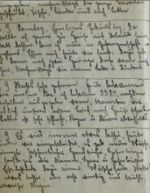POW at Park Hall
Wilhelm Eid was a soldier in the German army and fought in World War 1 from 1914 until he became a prisoner of war on the 26th of August 1918 and was held at Park Hall camp near Oswestry.
Over a century later, when the eldest of his four daughters died at the age of 94, her son Joachim Rettig discovered Wilhelm's war diary among her possessions.
"I knew him personally and can remember him well, Wilhelm Eid, my maternal grandfather, although he died when I was only five years old. He had a dog, Brigga, a fairly large Airedale Terrier, which, however, seemed to me somewhat frightening. I remember my grandfather as an exceptionally strict but lovable person. Strict, for example, if I did not like my food he sent me, a small fellow, out into the hallway where I had to stay until I had left the plate empty. Lovable when he was sitting comfortably with his grandchildren and we had bouillon together." Joachim Rettig 2017.
Wilhelm had recorded events as handwritten notes in small notebooks and when the war was over he had accurately copied these into to a single large notebook which covered the period from 6 August 1914 to 30 April 1917. Four of the original small notebooks survived, numbered 8-10. A final notebook, not numbered, covered the period from the 26th of August 1918 until his release in October 1919, while he was a prisoner of war at Park Hall.
Joachim has produced a CD with a transcription into modern German; and copies of all the notebooks, photographs, and maps. The work took several months and Joachim writes;
"It is fascinating, so terrible was the First World War. Wilhelm Eid describes his war experiences neutrally, rarely - if ever - judgemental. He does not ask the question "Why?", On the contrary, it is a description of his job as a soldier in an emergency. And on every page the reader is reminded of the meaninglessness of the war in an impressive way, especially in the description of the Battle of Verdun (February 21 to December 15, 1916), from February 21 to October 25, 1916. Nevertheless, here and there the diary does not lack a certain dry humour, for example when he writes "the French send back iron greetings". There are also a few very emotional passages, for example when it comes to Christmas at the front."
What follows is a translation of the last notebook and Wilhelm's moving and stoical account of his time in captivity at Park Hall.
Oswestry & Border History & Archaeology Group - January 2018
The original diaries are now deposited and stored in
Württembergische Landesbibliothek /Bibliothek für Zeitgeschichte
The Württemberg State Library - Stuttgart - Germany



